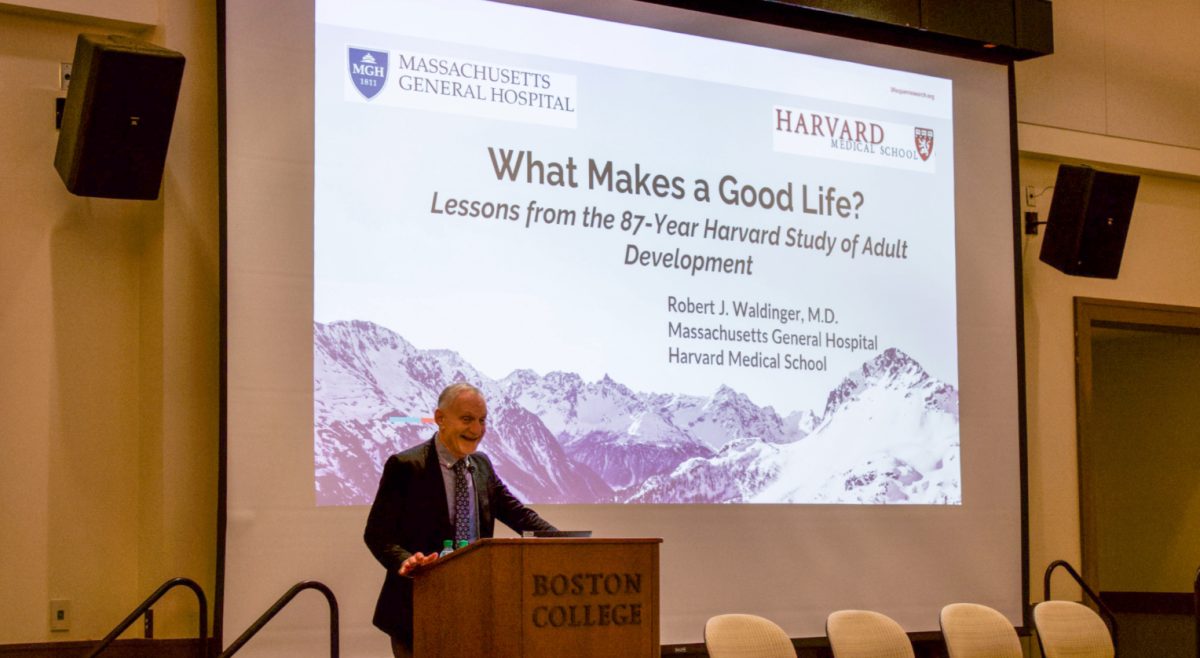After 26 years in the position, Thomas McGuinness left his role as associate vice president and director of University Counseling Services (UCS) this semester to become associate vice provost. Craig Burns, formerly the associate director of UCS, is currently serving as interim director.
 McGuinness worked in university mental health for 40 years and has been a counseling center director for 39 years. He said he felt it was time for a change—not only for himself, but for the leadership of counseling services.
McGuinness worked in university mental health for 40 years and has been a counseling center director for 39 years. He said he felt it was time for a change—not only for himself, but for the leadership of counseling services.
Burns has been at Boston College for almost 11 years. Upon his promotion to interim director, Eileen Suhrhoff stepped in to become the interim associate director in place of Burns. Suhrhoff has served as a senior staff psychologist at UCS, which oversees the mental health and well-being of the BC community.
Burns said he is grateful for the support and the trust from Vice President of Student Affairs Barb Jones, who made the decision to appoint him to the role of interim director. He is familiar with the department and the campus and hopes to have the faith of the community that he could take on the role.
“I think the fact that I was associate director made [the decision] a logical choice,” Burns said.
Burns said that there haven’t been any changes to the role of director. He explained, however, that McGuinness had a dual position where he was both the director of UCS and associate vice president. As a result, McGuinness oversaw the areas of counseling, health services, and the Office of Health Promotion. Since Burns has only taken over the position of director, the oversight of those departments has shifted, as has the role of associate vice president.
“[Being the director] is always a new challenge—something new each day. There are many different people to respond to, and many different concerns.”
-Craig Burns
In his job in counseling services, McGuinness said the work came to him. The biggest difference in his role as associate vice provost, he said, is that he has to generate the work and market himself. In this new position, McGuinness is interested in working with faculty on various projects and policies to promote student resilience.
Students encounter many things for which they do not have to go to counseling services and McGuinness said he hopes to help faculty manage those things on their level. He is currently meeting with faculty—individually, or in groups—to get a sense of what their experience is in dealing with students’ emotional issues and trying to support them in that part of their work.
“A student may not be able to complete an assignment and they go to a faculty member and say, ‘I can’t get this paper in on time,’” McGuinness said. “It could be that the student is struggling with something and there are lots of ways in which you can deal with that as a faculty member, and some people might say, ‘Well, why don’t you go to counseling services?’ rather than saying, ‘Well, tell me what’s going on?’”
McGuinness said although there are times when psychological services are required for students, often they are not. Many of the things students are struggling with are everyday problems in life, and they need some support and advice from faculty, McGuinness said. He hopes to mobilize people to look at their opportunities to be helpful to one another.
McGuinness said that there has been a 10-percent increase in student requests from counseling services every year for the last five years. He said that the number of students appearing in emergencies has doubled in five years and there has been no increase in staff. McGuinness expressed his hopes that UCS obtains more resources, as well as that his work helps to reduce the need for these services.
“People in counseling services, in some ways, get overwhelmed,” McGuinness said. “There are just so many students who are requesting services.”
As interim director, Burns’ ultimate responsibility is to manage the work of UCS. He said that he does some, but less clinical service than he used to as a staff psychologist. He also conducts outreach consultation with students, but the primary responsibilities involve coordination of care within the department. This includes coordination of the services UCS offers—within Student Affairs, in particular—as well as staying on top of both campus trends and national trends, and responding and reporting to colleagues and his superiors, including Jones.
UCS has three departments that work closely together: the Office of Counseling Service, the Office of Health Promotion, and the Office of Health Services. UCS also works in collaboration with the Office of Residential Life, the Women’s Center, and various other offices and departments around campus.
“[Being the director] is always a new challenge—something new each day,” Burns said. “There are many different people to respond to, and many different concerns.”
Burns said that he is meant to act as interim director until the end of this year, but the plan is beyond that is yet to be determined. McGuinness said that he expects Jones will be initiating a national search for director after Jan. 1.
For the time being, Burns said he hopes to continue to respond as best he can to an ever-growing set of demands on UCS. His biggest goal is that students flourish in their time at BC, with the help UCS can provide in removing barriers to success.
“I’m certainly very happy in this role and hope to serve the community well,” Burns said.
Featured Image by Alex Gaynor / Heights Staff







